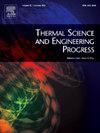Experimental investigation on the design of a three-phase power factor corrector utilizing a SEPIC converter
IF 5.1
3区 工程技术
Q2 ENERGY & FUELS
引用次数: 0
Abstract
A new configuration for a three-phase electric vehicle (EV) charger based on the Single-Ended Primary Inductor Converter (SEPIC) topology. The proposed charger operates as a power factor correction (PFC) converter, offering both step-up (boost) and step-down (buck) functions, enabling efficient adaptation to different input voltage levels while ensuring a stable DC output. By incorporating closed-loop current control and fast-switching regulation, the system attains unity power factor, which helps to reduce power losses and improve overall power quality. A unique control technique is proposed to regulate input current under unbalanced voltage conditions, ensuring reliable operation and high efficiency even during grid fluctuations. Simulations using MATLAB/Simulink demonstrate that, in unbalanced voltage scenarios, the control method maintain stable input current shaping, highlighting the system’s resilience. The results validate the SEPIC-based EV charger’s ability to consistently deliver efficient charging performance in both balanced and unbalanced voltage conditions, while achieving unity power factor and stable voltage regulation.
利用 SEPIC 转换器设计三相功率因数校正器的实验研究
基于单端初级电感器转换器(SEPIC)拓扑结构的三相电动汽车(EV)充电器的新配置。拟议的充电器作为功率因数校正(PFC)转换器运行,同时具有升压(升压)和降压(降压)功能,能够有效适应不同的输入电压水平,同时确保稳定的直流输出。通过采用闭环电流控制和快速开关调节,该系统可达到统一功率因数,从而有助于减少功率损耗并提高整体电能质量。该系统提出了一种独特的控制技术,可在不平衡电压条件下调节输入电流,从而确保即使在电网波动时也能可靠运行并实现高效率。使用 MATLAB/Simulink 进行的仿真表明,在不平衡电压情况下,该控制方法能保持稳定的输入电流整形,突出了系统的弹性。结果验证了基于 SEPIC 的电动汽车充电器能够在平衡和不平衡电压条件下持续提供高效的充电性能,同时实现统一功率因数和稳定的电压调节。
本文章由计算机程序翻译,如有差异,请以英文原文为准。
求助全文
约1分钟内获得全文
求助全文
来源期刊

Thermal Science and Engineering Progress
Chemical Engineering-Fluid Flow and Transfer Processes
CiteScore
7.20
自引率
10.40%
发文量
327
审稿时长
41 days
期刊介绍:
Thermal Science and Engineering Progress (TSEP) publishes original, high-quality research articles that span activities ranging from fundamental scientific research and discussion of the more controversial thermodynamic theories, to developments in thermal engineering that are in many instances examples of the way scientists and engineers are addressing the challenges facing a growing population – smart cities and global warming – maximising thermodynamic efficiencies and minimising all heat losses. It is intended that these will be of current relevance and interest to industry, academia and other practitioners. It is evident that many specialised journals in thermal and, to some extent, in fluid disciplines tend to focus on topics that can be classified as fundamental in nature, or are ‘applied’ and near-market. Thermal Science and Engineering Progress will bridge the gap between these two areas, allowing authors to make an easy choice, should they or a journal editor feel that their papers are ‘out of scope’ when considering other journals. The range of topics covered by Thermal Science and Engineering Progress addresses the rapid rate of development being made in thermal transfer processes as they affect traditional fields, and important growth in the topical research areas of aerospace, thermal biological and medical systems, electronics and nano-technologies, renewable energy systems, food production (including agriculture), and the need to minimise man-made thermal impacts on climate change. Review articles on appropriate topics for TSEP are encouraged, although until TSEP is fully established, these will be limited in number. Before submitting such articles, please contact one of the Editors, or a member of the Editorial Advisory Board with an outline of your proposal and your expertise in the area of your review.
 求助内容:
求助内容: 应助结果提醒方式:
应助结果提醒方式:


